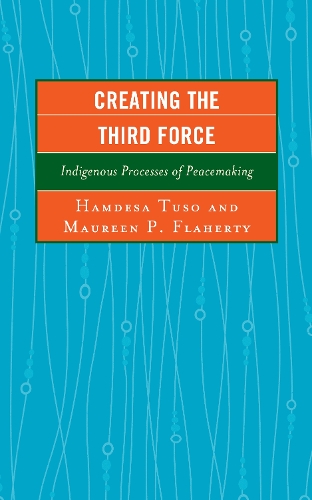
Creating the Third Force: Indigenous Processes of Peacemaking
(Paperback)
Available Formats
Publishing Details
Creating the Third Force: Indigenous Processes of Peacemaking
By (Author) Hamdesa Tuso
Edited by Maureen P. Flaherty
Contributions by Lobar Azizova
Contributions by Nodira Azizova
Contributions by Bruce Barnes
Contributions by Paul Cormier
Contributions by Maureen P. Flaherty
Contributions by Ali Gohar
Contributions by George Emile Irani
Contributions by Marianne Kamp
Bloomsbury Publishing PLC
Lexington Books
8th November 2018
United States
Classifications
Professional and Scholarly
Non Fiction
Indigenous peoples / Indigeneity
Peace studies and conflict resolution
327.172
Physical Properties
Paperback
586
Width 154mm, Height 217mm, Spine 36mm
948g
Description
The profession of peacemaking has been practiced by indigenous communities around the world for many centuries; however, the ethnocentric world view of the West, which dominated the world of ideas for the last five centuries, dismissed indigenous forms of peacemaking as irrelevant and backward tribal rituals. Neither did indigenous forms of peacemaking fit the conception of modernization and development of the new ruling elites who inherited the postcolonial state. The new profession of Alternative Dispute Resolution (ADR), which emerged in the West as a new profession during the 1970s, neglected the tradition and practice of indigenous forms of peacemaking. The scant literature which has appeared on this critical subject tends to focus on the ritual aspect of the indigenous practices of peacemaking. The goal of this book is to fill this lacuna in scholarship. More specifically, this work focuses on the process of peacemaking, exploring the major steps of process of peacemaking which the peacemakers follow in dislodging antagonists from the stage of hostile confrontation to peaceful resolution of disputes and eventual reconciliation. The book commences with a critique of ADR for neglecting indigenous processes of peacemaking and then utilizes case studies from different communities around the world to focus on the following major themes: the basic structure of peacemaking process; change and continuity in the traditions of peacemaking; the role of indigenous women in peacemaking; the nature of the tools peacemakers deploy; common features found in indigenous processes of peacemaking; and the overarching goals of peacemaking activities in indigenous communities.
Reviews
This volume makes an important contribution in allowing the intellectual community to rediscover indigenous peacemaking processes and (re)consider alternative approaches to addressing conflict, as well as managing the increasing diversification and fragmentation of our societies. * South African Journal of International Affairs *
Creating the Third Force is a welcome addition to the growing literature on peacebuilding and conflict management. The volume advances, broadens, and deepens our knowledge of indigenous peacebuilding and conflict management. It demonstrates the efficacy of indigenous peacebuilding tools including storytelling, proverbs and metaphors, rituals and symbols, collaborative social systems, and deployment of visual and performing arts. -- Akanmu G. Adebayo, Kennesaw State University
This volume provides a valuable and timely service to the comparative study of the new Western-based field of conflict and peace studies by emphasizing indigenous processes of conflict resolution from across the world. By opening a window into the peculiarities of the human experience of conflict and peacemaking processes that have a long history in indigenous societies in many parts of the world, the volume brings forth new perspectives in conflict and peace studies. -- Fonkem Achankeng I, University of Wisconsin Oshkosh
Creating the Third Force brings to light a novel approach by delving into the oft-neglected role of indigenous culture, cosmology and methods of conflict resolution. This beautifully written, organized, and timely book will make an immense contribution to the field of conflict resolution and is indispensable read for students, scholars, practitioners and policy makers as well as those who are engaged in an arduous task of peace-making and peace-building to achieve lasting peace. -- Abbas H. Gnamo, University of Toronto
Author Bio
Hamdesa Tuso is a faculty member of the Peace and Conflict Studies Program of University of Manitoba. Maureen P. Flaherty is assistant professor in peace and conflict studies at the University of Manitoba.
